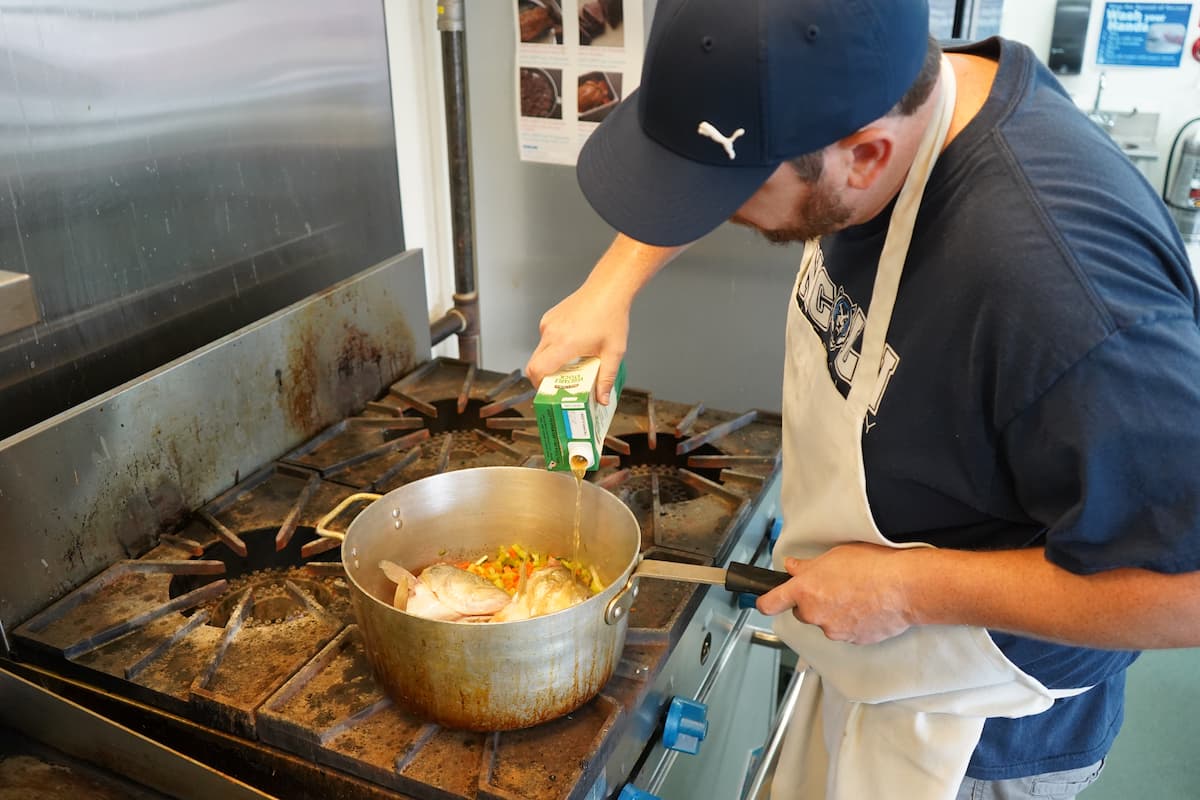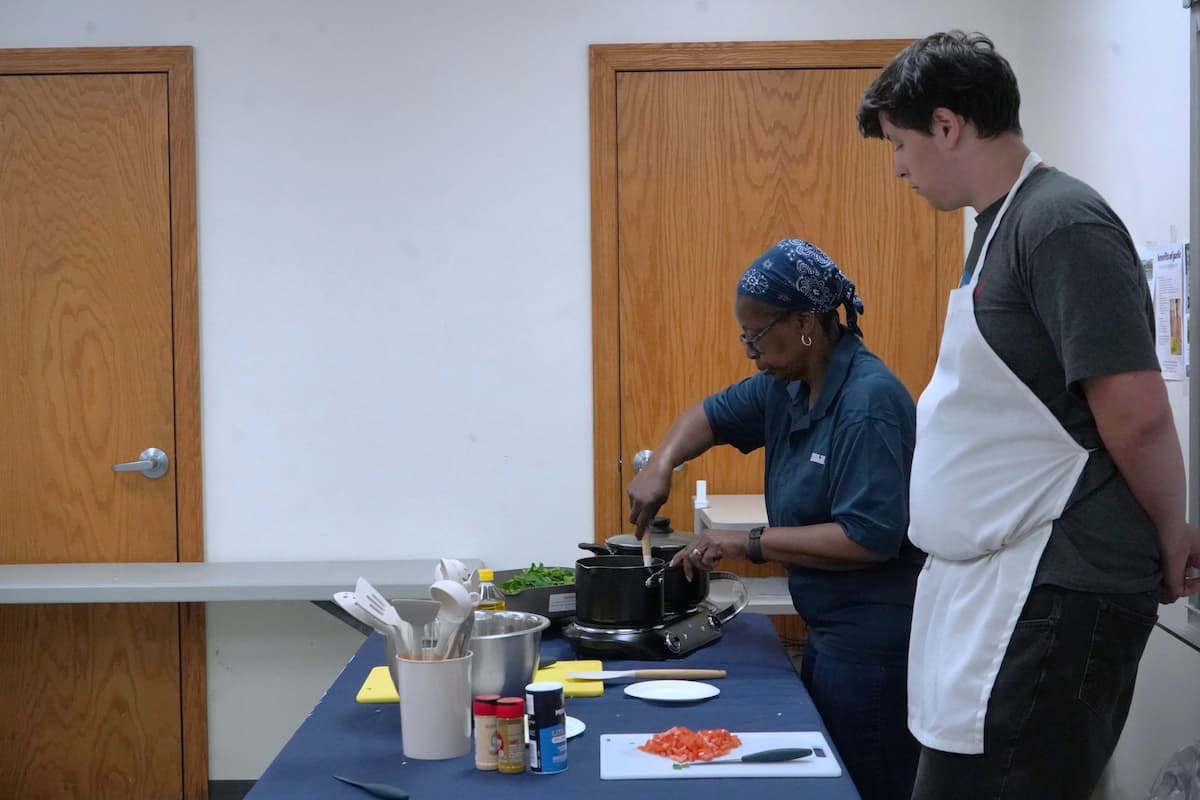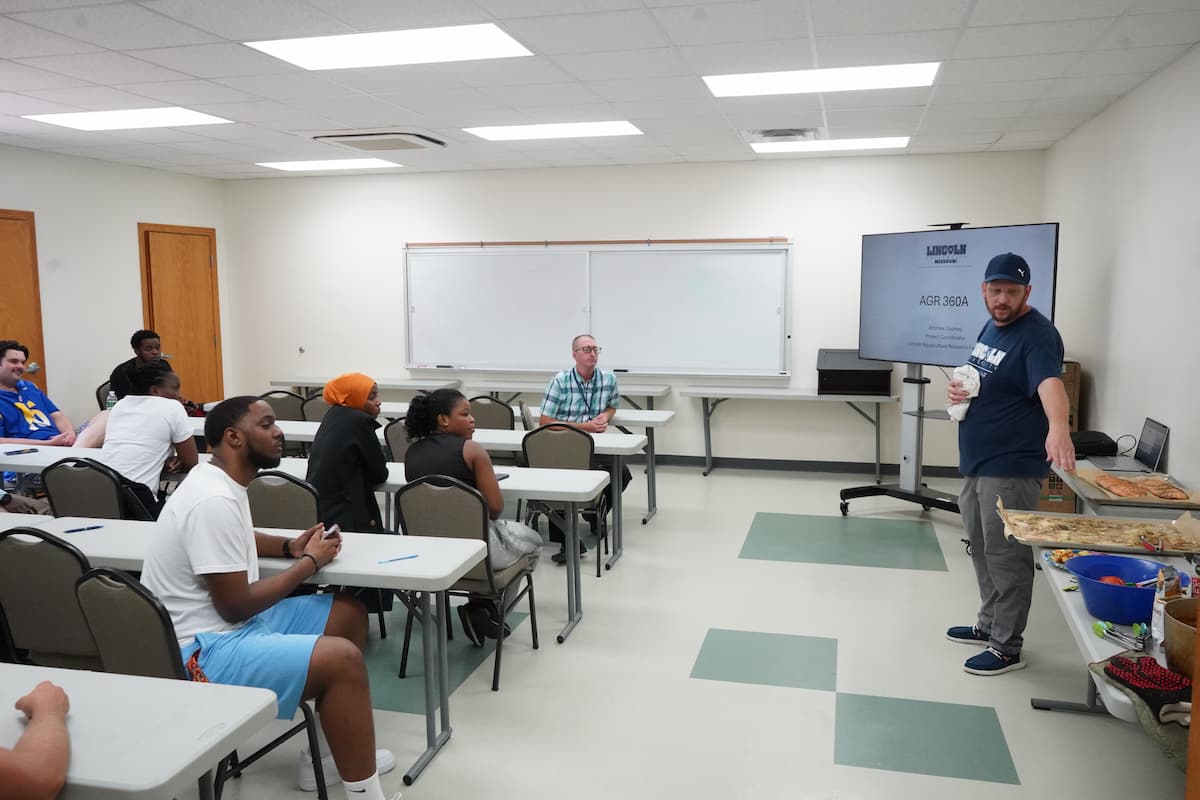Lincoln Supports Families with Nutrition, Food Safety and Health Education
Office of Communications and Marketing
Young Hall
820 Chestnut Street
Jefferson City, MO 65101
 Josh Dunne adds ingredients to fish stew made for AGR-360A Fundamentals of Aquaculture class.
Josh Dunne adds ingredients to fish stew made for AGR-360A Fundamentals of Aquaculture class.
Improving family health involves more than increasing access to food; it begins with understanding it. Experts at Lincoln University of Missouri (LU) are emphasizing the importance of nutrition, food safety and education to help families across the state make informed choices for healthier lives.
Judith Mutamba, LU’s state extension specialist for human nutrition and health, explained food security depends on three key factors: nutrition, accessibility and affordability.
She emphasized proximity alone isn’t enough — people must also have the means to reach the food. Food security, she added, means ensuring every member of a household has enough nutritious food, not merely food being present in the home.
“If there are twelve children, a single bag of apples isn’t enough for all of them,” she said.
She explained the main barriers to better nutrition are cost, access and the time needed to prepare meals. Cultural attitudes toward food can also play a role.
Some nutritious foods are looked down upon as ‘poor people food,’ and this bias makes it harder for families to make healthy choices.
“People don’t want to be associated with not being able to afford foods,” Mutamba said.
Fortunately, improving family nutrition starts with something simple: learning to read food labels. “The first item on the ingredient list is what is most prominent in the food,” she said. “High-sugar cereals should be avoided when possible, and it’s better to go for whole-grain options such as oatmeal.” She added foods high in fiber and protein should be prioritized for lasting energy and overall health.
Dried fruits and vegetables can also be good choices. While they may lose some water-soluble vitamins in the drying process, they remain nutrient-dense and easy to store for longer periods.
 Judith Mutamba, with the help of Sage Jakobi, demonstrates how to cook pumpkin leaves at 4-H Day 2025.
Judith Mutamba, with the help of Sage Jakobi, demonstrates how to cook pumpkin leaves at 4-H Day 2025.For Laveta Lockridge, a nutrition educator who works in LU’s Caruthersville Outreach Center, improving the health of families starts with education. Like Mutamba, she said understanding nutrition labels is one of the simplest and most powerful tools to encourage smarter eating habits.
“To empower families, we can start by teaching children how to read and interpret nutrition facts in an engaging and personalized way,” Lockridge said. She recommends hands-on activities where kids explore food labels like detectives, uncovering what’s really in their snacks.
“This approach isn’t just about numbers — it’s about giving families the confidence to make informed choices, together,” said Lockridge. “And when families learn together, they grow stronger — body, mind and spirit.”
Food safety is another critical aspect of family health. Dr. Sujan Acharya, professor of food science at LU, develops educational newsletters and publications on safe food handling, freezing and preservation methods.
Acharya said home preservation methods such as cooking, chilling, freezing and canning are vital to maintaining quality and safety.
“Home food preservation is anything we do to improve the quality and safety of the product. For example, freezing helps enhance the safety of the food product by slowing the growth of microorganisms such as bacteria,” Acharya said. “It doesn’t kill microorganisms but temporarily stops their growth.”
He added frozen fruits and vegetables lose little flavor or nutritional value and can typically be stored for up to a year.
He also warns against leaving raw food out for too long, which can quickly become dangerous.
“Two hours is enough time for deadly bacteria to grow in your food and make you sick,” Acharya warned. “If it’s there, it will grow.”
Food safety also extends to what’s fresh and local. Dr. Anitha Chitturi, LU’s state extension specialist for integrated pest management, said families should learn to recognize signs of disease or contamination in produce.
“Speckled or spotted tomatoes, if they don’t know what it is, people think it’s just the natural way the tomato looks,” Chitturi said. “But no, it has a virus.”
She warned infected fruits like tomatoes or eggplants may cause illness in sensitive individuals.
“Consumers also need to wash their vegetables,” Chitturi said, as produce is often sprayed with pesticides or chemicals to keep it looking fresh during transport and display.
 Josh Dunne shows the AGR-360A Fundamentals of Aquaculture students the dishes he made — fish head soup, roasted bass straight from LU’s ponds, salmon and fresh sides.
Josh Dunne shows the AGR-360A Fundamentals of Aquaculture students the dishes he made — fish head soup, roasted bass straight from LU’s ponds, salmon and fresh sides.
At the LU Commercial Kitchen, Manager Josh Dunne commented on LU’s mission to make positive changes throughout the state.
“Lincoln has a unique opportunity as an 1890 land-grant school to really get out there and provide some education,” Dunne said.
Dunne pointed out that 9 out of 10 Americans don’t include enough protein or fiber in their diets. To help fix this, he said, families should focus on eating more fruits and vegetables. He said the form doesn’t matter as much as the nutrients — fresh, frozen or canned, they simply need to be eaten. He suggested looking for foods with at least 5% or more of the daily recommended protein and fiber per serving.
When it comes to maintaining a healthy diet, Dunne recommended a balanced approach.
“Eighty percent needs to be whole foods like fruits, vegetables, lean meats and whole grains. And then 20% can be whatever you want it to be. If you want the other 20% to be Oreo cookies, cool,” he said.
In addition to eating right, Dunne said it’s important for people to engage in regular exercise.
“Walking, strength training, moving where you can. There are even chair exercises,” he said.
Dunne also highlighted proper hygiene as essential to food safety. Washing hands with soap for at least 20 seconds under running water and using a single-use towel is one of the most effective ways to prevent illness, he said.
Lincoln University’s nutrition and food safety experts share a common goal: to empower families with the knowledge and tools they need to thrive. By turning education into action — from reading labels to preserving food safely and recognizing healthy choices — LU continues to help Missourians build stronger, healthier communities. When families understand their food, they don’t just eat better — they live better.
